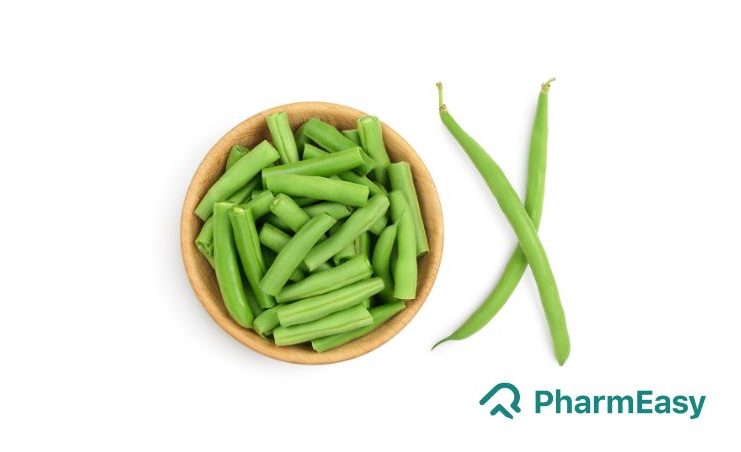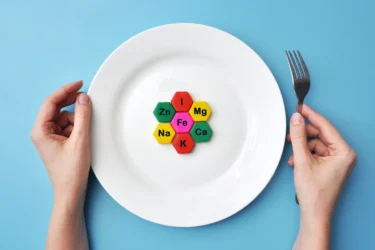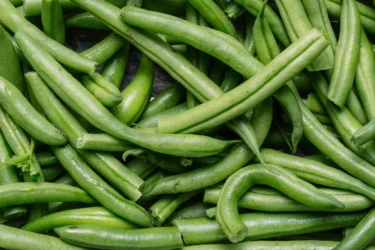French Beans: Uses, Benefits & Side Effects
By Dr. Nikita Toshi +2 more

Get,

to manage your symptom
Get your,


4 Cr+ families
benefitted

OTP sent to 9988776655



You’ve successfully subscribed to receive
doctor-approved tips on
Whatsapp

Get ready to feel your best.

Hi There,
Download the PharmEasy App now!!


Register to Avail the Offer
Send OTPBy continuing, you agree with our Privacy Policy and Terms and Conditions

Hi There,
Sign up on PharmEasy now!!
Trusted by 4 crore+ families

OTP sent to 9988776655



You have unlocked 25% off on medicines




Code: NU25
By Dr. Nikita Toshi +2 more
Table of Contents
Green beans are unripe, young fruits of the common bean (Phaseolus vulgaris). They are referred to by many names, such as French beans (French- haricot vert), snap beans or string beans (modern varieties happen to be stringless). In the Philippines, Green beans are known as Baguio beans/ habichuelas to differentiate them from yardlong beans.
Green beans are different from other varieties of beans because the green beans are consumed and harvested while the enclosing pods are still intact and the bean seeds haven’t yet fully matured within. Originally, green beans were found in South and Central America, where there has been evidence of cultivation in Peru and Mexico for many years. The three common types of green beans come under the species category Phaseolus vulgaris. These three are snap or string beans with a round, flat pod; French or stringless beans that lack a fibrous, tough string running along the side of the pod; runner beans belonging to the separate species, Phaseolus coccineus.

Looking at the nutritional profile of French beans, raw green beans contain 90% water, 2% protein, 7% carbohydrates and negligible fat. In a 100-gram quantity of French beans, one is provided 31 calories and a moderate amount of vitamin K, vitamin C, manganese and vitamin B with other micronutrients in low quantity. Green beans are also a good source of thiamin, folate, riboflavin, potassium and magnesium.
The above information indicates the nutritional breakdown of about 150 grams of snap bean2.
French beans may have the following uses for human health:

Green beans or French beans can contain significant amounts of chlorophyll2, which can impede the carcinogenic effects of the heterocyclic amines that are created when meat is grilled at high temperatures1. So, it is recommended that those who like to have their grilled meat a little bit charred should balance the negative effects of their meal with boiled French beans.

The body needs protein in order to maintain hair, healthy bones, muscles and organs. Protein is also key in order to maintaining a healthy immune system. Although plant proteins lack one of the amino acids needed by the body, when combined with other protein sources, they can turn out to become complete proteins and still prove to be beneficial for the body3.

`French beans contain essential vitamins that include folate. A cup of raw green beans contains about 33 mcg of folate, which is almost 10% of the daily recommended dietary intake. Folate is a B vitamin that prevents birth defects and other neural tube defects.
A cup of raw green beans contains 12.2 mg of vitamin C, which is about 25% of the recommended daily intake. Vitamin C is an antioxidant that maintains the immune system and plays an integral role in collagen production, protecting the skin from oxidative stress.
A cup of raw French beans offers about 690 IU of vitamin A, which is a group of compounds referred to as retinoids. Vitamin A is important because it aids in healthy immunity, healthy vision and reproduction.
French beans are a good source of minerals such as manganese which has antioxidant properties and supports metabolism. Manganese also promotes the quick healing of wounds and supports bone health3.

One of the primary causes of depression is the imbalance of neurotransmitters and chemicals in the brain. Dopamine, serotonin and norepinephrine are essential for maintaining good brain health. At times, when their levels drop within the brain, it can lead to symptoms of depression. The chemical homocysteine hampers the production of norepinephrine and serotonin. French beans contain a decent amount of B9 or folate, which can help lower levels of homocysteine in the body. Thus, consuming French beans can be beneficial for brain health4.

Iron is an essential mineral required by the body in order to produce new red blood cells. The cells help in oxygen transportation in the body. A person suffering from anaemia or iron deficiency will feel fatigued most of the time, along with weakness and slow metabolism. So, someone suffering from anaemia can benefit from consuming French beans3. One hundred grams of French beans is equivalent to a person’s 25% of daily iron intake.
According to Harvard Medical School, increasing the amount of iron a woman of childbearing age consumes from plant sources including spinach, beans, pumpkin, and green beans may help with fertility. I read in an article and it said that, a woman’s degree of fertility and the amount of nutrients, particularly iron, she consumes, are related. Iron absorption can be enhanced by consuming foods high in vitamin C, such as tomatoes, bell peppers, or berries, together with meals high in iron2.
Dr. Siddharth Gupta, B.A.M.S, M.D (Ayu)

High cholesterol leads to a build-up of fat deposits within the arteries and decreases blood flow to the brain and heart, causing stroke or heart attack. French beans support good heart health because they don’t contain cholesterol. A cup of raw French beans contains 2.7 g of fibre, whereas the boiled variant contains 4.0 g of fibre along with soluble fibre. Soluble fibre can help reduce total cholesterol or bad cholesterol levels. French beans help to reduce inflammation and blood pressure, so consuming a cup of it daily can prove to be very healthy for you.
When fat builds up in the liver, it may result in fatty liver. It may emerge together with metabolic syndrome symptoms such as obesity, high cholesterol, high blood pressure, and others. Losing weight, managing blood sugar levels, and lowering blood levels of fats like triglycerides and low-density lipoprotein (LDL), or bad cholesterol are the mainstays of medical practitioners’ treatments for fatty liver disease. From my experience, beans are a wonderful alternative to animal proteins that are richer in fat for improving liver function2.
Dr. Rajeev Singh, BAMS
Also Read: Sonth: Uses, Benefits and Side effects by Dr. Smita Barode
French beans are extremely healthy, but there are certain side effects that people need to know about. Those who are on blood thinners should refrain from eating excessive French beans since they contain significant amounts of vitamin K. This vitamin can speed up the blood clotting process in wounds and counteract the effects of blood-thinning medications.
Excess consumption of French beans can give rise to digestive issues such as gas, flatulence and bloating. Aside from vitamin K, French beans also contain lectin, which can cause a number of gut-related problems. So, the ideal recommended daily intake for French beans is 1-2 cups daily.
Another factor is that French beans are best consumed cooked in some form. If you are buying canned French beans from the store, then cooking the French beans can also lower the sodium levels.
Also Read: Maple Syrup: Uses, Benefits, Side Effects By Dr. Smita Barode
While eating French beans, it is advised that you eat them cooked because raw beans contain lectin, which is a protein that acts as a natural insecticide or antifungal for plants. So, when French beans are consumed raw, the lectin present can bind to the surface cells of the digestive system and cause symptoms such as diarrhoea, vomiting, nausea and bloating.
If you do experience side effects, it is recommended that you consult a doctor.
Also Read: Jicama (Mexican Turnip): Uses, Benefits, Side Effects & More!
Consuming cooked French beans is always better than eating them raw. Although cooking the beans can decrease the nutritional value of some vitamins, it increases the levels of antioxidants such as isoflavones and carotenoids on the other hand. Cooking also inactivates the presence of harmful lectins that upset the digestive system.
French beans are highly nutritious with little fat and calorie content. Additionally, they have high dietary fibre and protein content, which helps one feel fuller for longer, negating the need to eat snacks in between meals.
Yes, French beans can be safely consumed by diabetics because they have a low glycemic index. They don’t increase the glucose levels in the blood and provide energy, nutrients and minerals while maintaining blood sugar.
A study conducted has revealed that French beans contain the molecule known as chlorophyll which lowers the risk of cancer. Chlorophyll imparts the green colour to French beans and contains anti-cancerous properties. It blocks carcinogens which are responsible for causing cancer.
Yes, French beans contain a good amount of vitamin B9 or folate, which is beneficial for pregnant women. It lowers the risk of developing congenital diseases in a foetus and reduces the chances of neural tube defects.
Disclaimer: The information provided here is for educational/awareness purposes only and is not intended to be a substitute for medical treatment by a healthcare professional and should not be relied upon to diagnose or treat any medical condition. The reader should consult a registered medical practitioner to determine the appropriateness of the information and before consuming any medication. PharmEasy does not provide any guarantee or warranty (express or implied) regarding the accuracy, adequacy, completeness, legality, reliability or usefulness of the information; and disclaims any liability arising thereof.
Links and product recommendations in the information provided here are advertisements of third-party products available on the website. PharmEasy does not make any representation on the accuracy or suitability of such products/services. Advertisements do not influence the editorial decisions or content. The information in this blog is subject to change without notice. The authors and administrators reserve the right to modify, add, or remove content without notification. It is your responsibility to review this disclaimer regularly for any changes.
Comments

Leave your comment...
You may also like
Comments